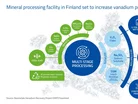Vanadium Recovery Project targets 1.5mn tonne drop in CO2

An EIT RawMaterials supported joint venture in Finland between two Australian project development companies, Critical Metals and Neometals, paves the way for a significant increase in high purity vanadium production in Europe for use in grid scale vanadium redox flow batteries (VRFBs), specialty steel applications and next generation lithium vanadium cells.
The Vanadium Recovery Project (VRP) is targeting a 1.5mn tonne reduction of CO2 reporting to the atmosphere over 10 years compared with conventional mining. The VRP won't have any waste streams and will set a new precedent for circular economy practices in metals processing.
The VRP, to be located in Pori, Finland, will receive 'slag' from local steel producers and recover some of the highest purity vanadium products in the world. This positions Critical Metals and Neometals on the cusp of becoming major producer of vanadium in Europe late in 2024. The VRP relies on a novel proprietary hydrometallurgical process that results in no waste with by-products planned to be used in the production of CO2 free cement.
Vanadium is a critical raw material according to the European Commission and features superior energy density compared to other battery materials. It is fast becoming recognised as a significant addition to new lithium-ion cathode and anode chemistries used in electric vehicles as well as in VRFBs used for long duration energy storage solutions from renewable sources. Currently, approximately 75% of global vanadium supply is sourced from China, South Africa, and Russia.
With heightened pressure to diversify the source of critical raw materials, the VRP positively demonstrates Europe's commitment to secure its raw material supply chains and fast track energy dependence from fossil fuels to renewable energy.
Olli Salmi, Innovation Hub Baltic Sea Director at EIT RawMaterials said innovative projects like the Vanadium Recovery Project show how circular economy approaches can have a substantial impact on diversifying supply chains.
"Recovery of metals and minerals from by-products in an environmentally friendly manner will be very important source of raw materials for Europe, complementing sustainable mining projects. Therefore, we are excited to work with Critical Metals and Neometals on assessing funding opportunities as this project enters the next phase," he said.
"Securing raw materials for Europe requires innovation and close collaboration with countries and regions that share our environmental and ethical standards. EIT RawMaterials working with Australian firms ... demonstrates EIT RawMaterials' commitment to working with different countries to diversify Europe's raw materials supply."
Darren Townsend, Chief Development Officer at Neometals said: "We believe that in the next 10 years vanadium will be the 'new lithium'. We see a lot of parallels on where the vanadium industry is now versus where the lithium industry was 10 years ago. We are happy that EIT RawMaterials agrees with this assessment and continues to support us in driving this project rapidly forward."



